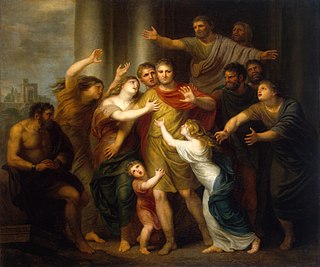Related Research Articles

The gens Atilia, sometimes written Atillia, was a plebeian family at ancient Rome, which rose to prominence at the beginning of the fourth century BC. The first member of this gens to attain the consulship was Marcus Atilius Regulus, in 335 BC. The Atilii continued to hold the highest offices of the state throughout the history of the Republic, and well into imperial times.

Annia Galeria Faustina the Elder, sometimes referred to as Faustina I or Faustina Major, was a Roman empress and wife of the Roman emperor Antoninus Pius. The emperor Marcus Aurelius was her nephew and later became her adopted son, along with Emperor Lucius Verus. She died early in the principate of Antoninus Pius, but continued to be prominently commemorated as a diva, posthumously playing a prominent symbolic role during his reign.

Herodes Atticus was an Athenian rhetorician, as well as a Roman senator. A great philanthropic magnate, he and his wife Appia Annia Regilla, for whose murder he was potentially responsible, commissioned many Athenian public works, several of which stand to the present day. He was one of the best-known figures of the Antonine Period, and taught rhetoric to the Roman emperors Marcus Aurelius and Lucius Verus, and was advanced to the consulship in 143. His full name as a Roman citizen was Lucius Vibullius Hipparchus Tiberius Claudius Atticus Herodes.
Marcus Appius Bradua, also known by his full name Marcus Atilius Metilius Bradua was a Roman politician who lived in the second half of the 1st century and the first half of the 2nd century in the Roman Empire.

Appia Annia Regilla, full name Appia Annia Regilla Atilia Caucidia Tertulla, was a wealthy, aristocratic and influential Roman woman, who was a distant relative of several Roman emperors and empresses. She was the wife of the prominent Greek Herodes Atticus.

The gens Annia was a plebeian family at ancient Rome. Livy mentions a Lucius Annius, praetor of the Roman colony of Setia, in 340 BC, and other Annii are mentioned at Rome during this period. Members of this gens held various positions of authority from the time of the Second Punic War, and Titus Annius Luscus attained the consulship in 153 BC. In the second century AD, the Annii gained the Empire itself; Marcus Aurelius was descended from this family.
Gnaeus Claudius Severus was a Roman senator and philosopher who lived in the Roman Empire during the 2nd century AD.
Appius Annius Trebonius Gallus was a Roman senator, who was active during the reign of Trajan. He was ordinary consul in 108, as the colleague of Marcus Appius Bradua.
Appius Annius Trebonius Gallus, sometimes known as Appius Annius Gallus was a Roman senator and consul.

Atilia Caucidia Tertulla was an aristocratic woman from Ancient Roman society.
Appius Annius Atilius Bradua was a Senator of the Roman Empire in the 2nd century AD.

Tiberius Claudius Atticus Herodes was a Greek aristocrat of the Roman Empire. Born into a wealthy family, his father was proscribed by Domitian, had his fortune confiscated, and was exiled or executed. Claudius Atticus restored his family's influence, becoming a senator and suffect consul in 133. His son, Herodes Atticus, erected a statue of him at the Nymphaeum of Herodes Atticus in Olympia.
Publius Aelius Vibullius Rufus was a Greek aristocrat who lived in the 2nd century in the Roman period. He served as archon of Athens in 143–144.
Claudia Tisamenis was a Greek aristocratic woman that lived in the 2nd century in the Roman Empire.

Marcia Annia Claudia Alcia Athenais Gavidia Latiaria, otherwise most commonly known as Athenais was a Roman noblewoman of Greek Athenian and Italian Roman descent who lived in the Roman Empire.
Athenais was a Roman noblewoman of Greek Athenian and Italian Roman descent. Athenais lived between the second half of the 2nd century and first half of the 3rd century in the Roman Empire.
Appia Annia Claudia Atilia Regilla Elpinice Agrippina Atria Polla otherwise most commonly known as Elpinice was a Roman noblewoman of Greek Athenian and Italian Roman descent who lived in the Roman Empire.
The gens Vibullia, occasionally written Vibulia, was a minor plebeian family at ancient Rome. Members of this gens first appear in history in the years following the Third Samnite War, but after this they are hardly mentioned until the end of the Republic, at which time they were of senatorial rank. A wealthy family of this name rose to prominence at Athens during the latter part of the first century. Others are known from inscriptions.

Eucles of Marathon was a leading Athenian statesman early in the reign of Augustus. He was responsible for the construction of the Roman Agora in Athens and was the male-line ancestor of the 2nd-century aristocrat, Herodes Atticus.
References
- 1 2 3 4 Pomeroy, The murder of Regilla: a case of domestic violence in antiquity
- 1 2 Graindor, Un milliardaire antique p. 29
- ↑ Wilson, Encyclopedia of Ancient Greece pp. 349-350
- ↑ Pomeroy, The murder of Regilla p. 14
- ↑ Pomeroy, The murder of Regilla p. 48
- 1 2 3 4 5 6 7 8 Pomeroy, The murder of Regilla p. 49
- ↑ McManus, Barbara F. "Plancia Magna, Aurelia Paulina, and Regilla: Civic Donors". Vroma.org. Retrieved 2010-04-28.
- 1 2 Wilson, Encyclopedia of Ancient Greece p. 350
- ↑ Susan I. Rotoff, "An Athenian Archon List of the Late Second Century after Christ", Hesperia, 44 (1975), pp. 402-8
- 1 2 3 Pomeroy, The murder of Regilla p. 50
- ↑ "Agora XV 460: Divine honours for Geta, 209/10 AD". www.atticinscriptions.com. Retrieved 16 September 2024.
- ↑ Inscriptions of Roman Tripolitania, by J. M. Reynolds and J. B. Ward-Perkins, enhanced electronic reissue by Gabriel Bodard and Charlotte Roueché (2009). "517. Honours for Ti. Cl. M. Appius Atilius Bradua Regillus Atticus"